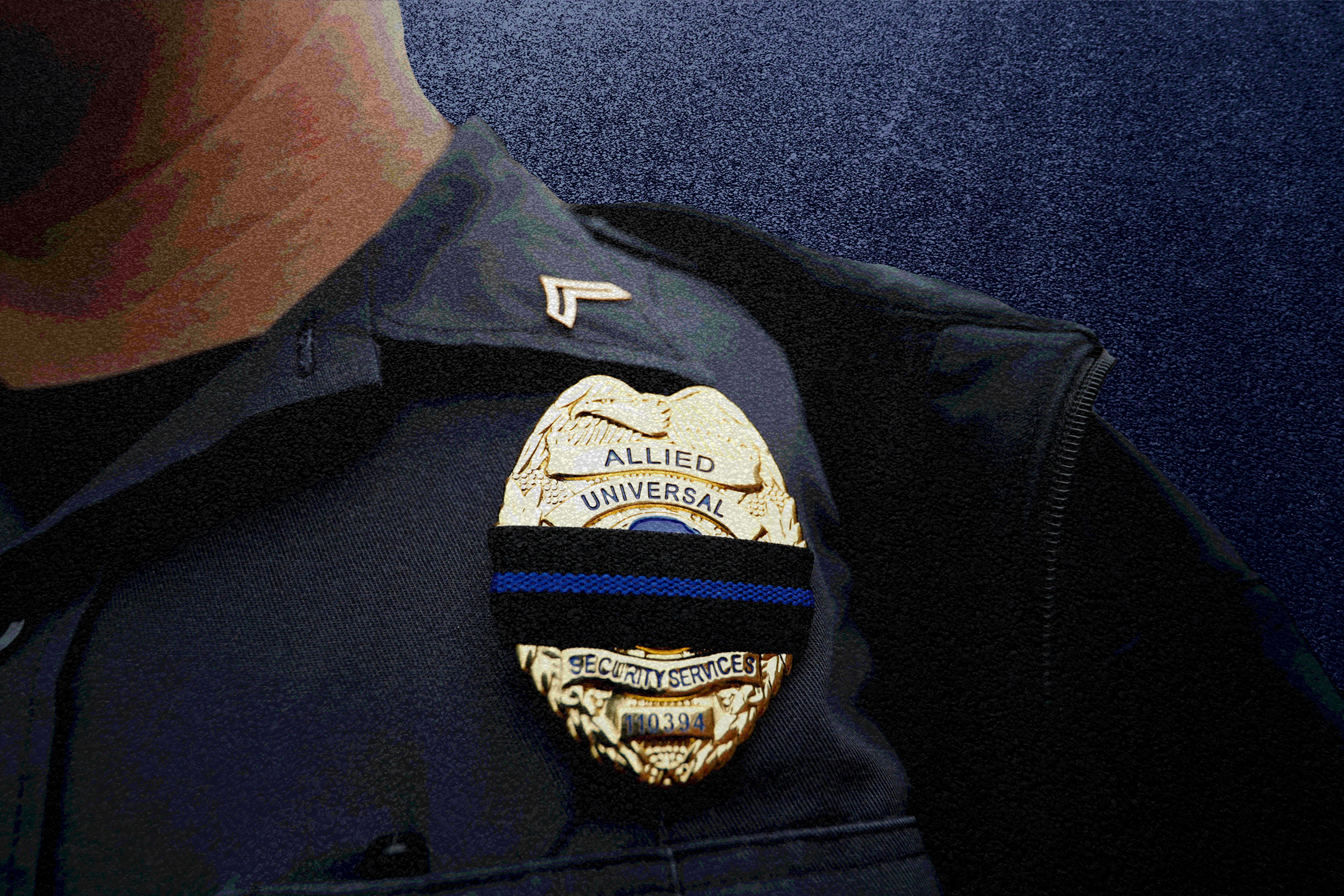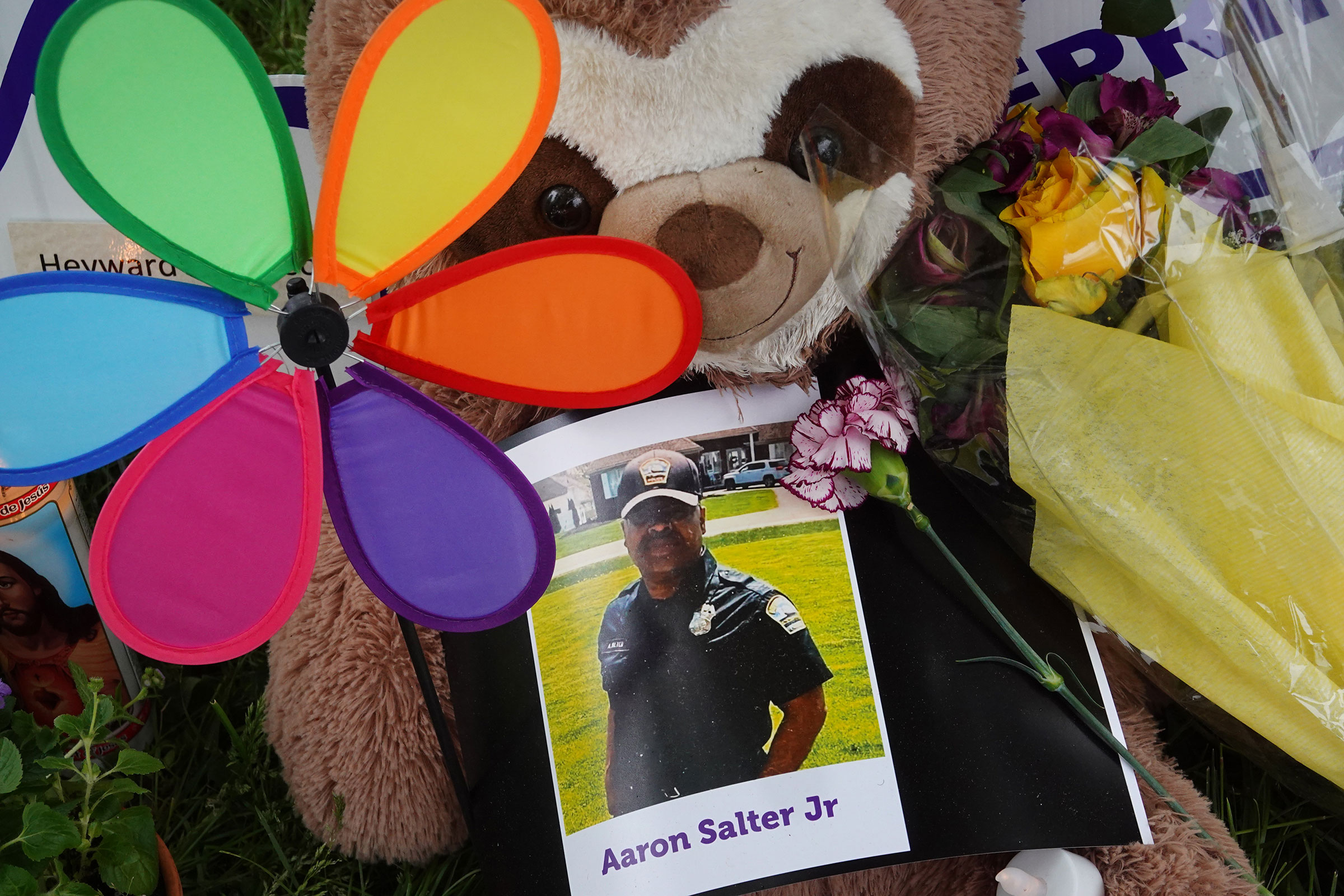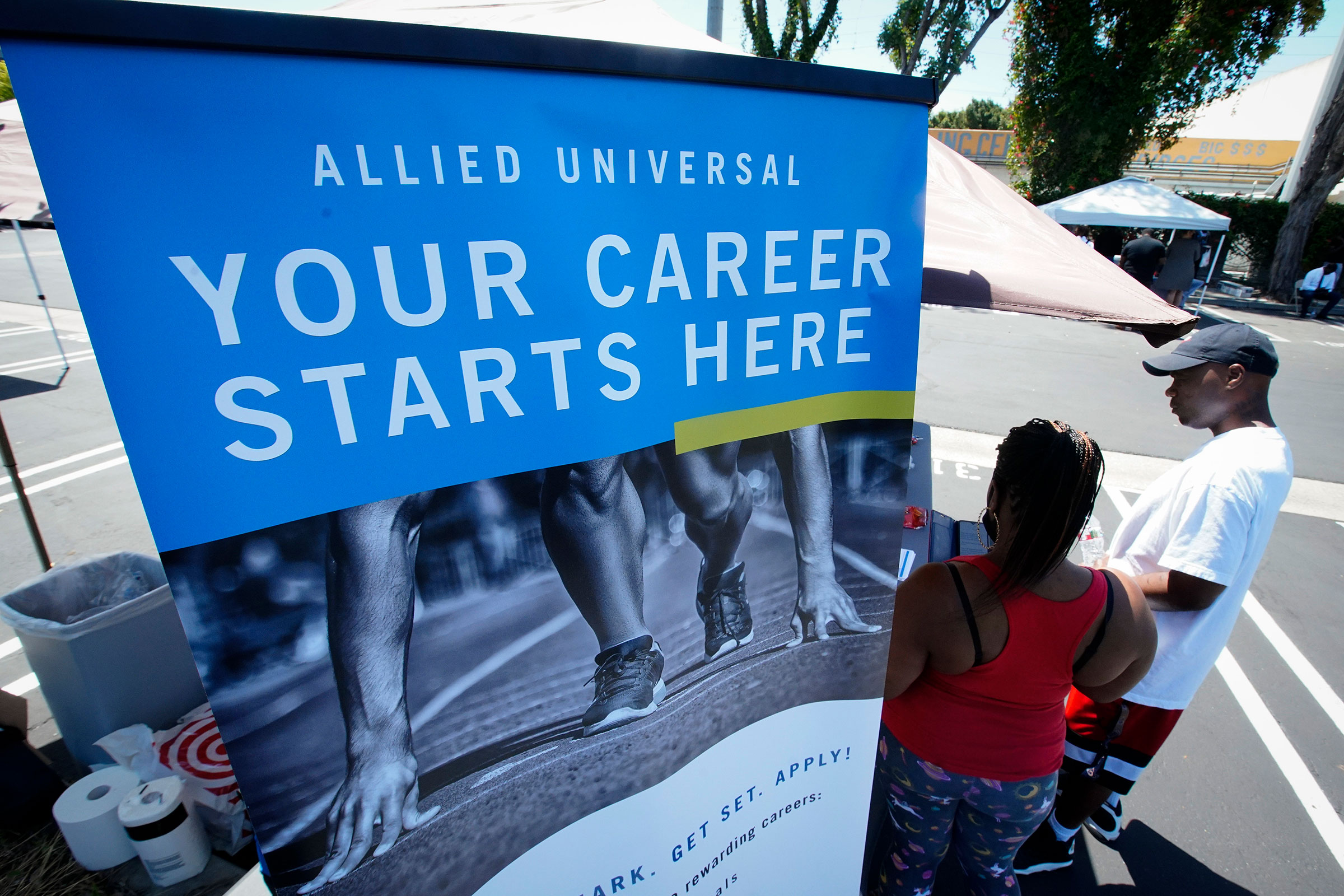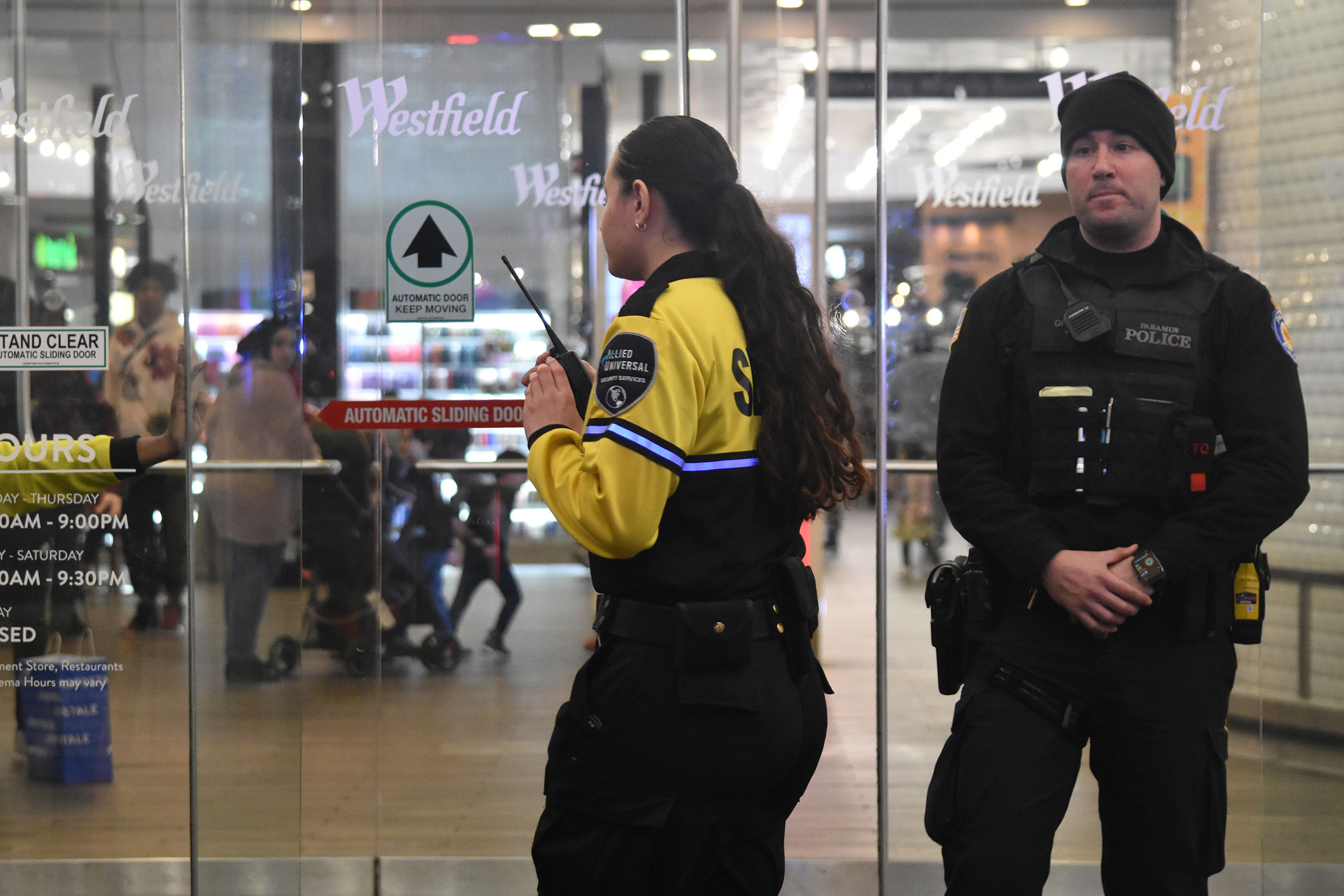
This story is the third of three in Insecure, a series about the private security industry. Read part 1: Private Security Guards Are Replacing Police Across America.And part 2: In the World of Private Security, There Aren’t Many Rules or Regulations
As housing costs spiked during the pandemic, San Diego’s homelessness problem became a crisis, and Christopher Russell was overwhelmed. As a security guard employed by Allied Universal at the behest of the owners of a shopping plaza in a scruffy neighborhood of San Diego, Russell’s duties were to ask the homeless people sleeping outside of the stores and parking garage to leave. They didn’t have anywhere to go, and some would move politely, but others had mental health or drug abuse issues and would spit on him or scream at him, he says. His job duties included calling authorities for backup, but he says the calls were such low priority that police sometimes wouldn’t come for hours.
“It gets violent over here,” says Russell, 36. “You really have to watch your back.” A police officer was recently shot in the face across the street. Russell says he tried to create a union of Allied workers but turnover was so high that it was hard to find anyone sticking along long enough to sign a union card. He’s worked for Allied twice, but says he quit the first time because the company failed to pay him for weeks on end. (Allied did not reply to a request for comment on this specific allegation.) Allied workers at his San Diego site make $19 an hour, not much higher than San Diego’s $16.30 minimum wage.
Allied Universal is America’s biggest company you’ve never heard of. With 800,000 employees globally and 300,000 in the U.S., it is the third-largest private employer in North America, after Walmart and Amazon. Most Americans interact with Allied employees daily—at airports, on public transit, in supermarkets, pharmacies and gas stations. Yet Allied has not faced the scrutiny that Walmart or Amazon have in recent years, perhaps because it doesn’t sell goods and services to consumers. This lack of public visibility has enabled the company to deploy underpaid and under trained guards in cities across America, where they put themselves and the general public at risk; Allied guards have allegedly killed civilians in the last year, some have also been killed themselves, including Christian LaCour, an Allied security guard killed at the mass shooting at Allen Premium Outlets in Texas on May 6, and Aaron Salter Jr., the Allied security guard killed at the mass shooting at a Buffalo supermarket in May 2022.
More from TIME
In a statement responding to LaCour’s death, Steve Jones, global chairman and CEO of Allied Universal, said that in the last few months, Allied’s guards have “administered life-saving medical aid, extinguished fires, foiled human trafficking, prevented suicides and removed firearms from public spaces.” Jones criticized negative media stories about security guards that he said failed to report on guards’ “heroic actions,” and said he was putting out a call to “reexamine how society views and portrays the millions of men and women who work every day to make the world safer.”

What he left out is that for many current and former employees, Allied itself is responsible for many of the negative experiences in the security industry. TIME interviewed 11 people across four states who currently work for Allied or who have worked for the company in the last two years. Their complaints include that they’re put in dangerous situations without essential equipment or training, and that Allied keeps winning contracts but lacks the staff to fulfill them. Many complain that Allied has miscalculated how much it owes them and missed paychecks. (A federal class action lawsuit filed in 2022 alleges that Allied pays employees based on scheduled hours rather than actual hours worked. Allied has disputed these claims in court; in April, Allied agreed to enter into mediation with its 27,000 Illinois security guards.)
“They’re worried about how many contracts they get, not about hiring good, quality people,” says one Allied guard, who works on the campus of the University of Pennsylvania and who did not want his name used for fear of jeopardizing his job. Though he works in an area with a lot of crime, and has been pushed around by civilians, he says he has not received de-escalation training or self defense training. His division is frequently short-staffed and provided with faulty equipment like broken radios. “It’s a broken system and people aren’t being trained properly,” he says.
Allied said, in a statement provided to TIME, that it has established procedures and protocols to serve and protect, “including training on enhanced situational awareness, de-escalation techniques, respect for cultural diversity and customer service,” but did not specifically comment on the guard’s claim.
Read more: In the World of Private Security, There Aren’t Many Rules or Regulations
TIME also reviewed 30 civil lawsuits filed since 2020 in which Allied is a defendant, and which allege that the company repeatedly failed civilians. They include a complaint from Eduardo Fernandez, a 76-year-old man who says he was robbed and beaten by a fellow passenger while traveling on Miami’s Metromover train in September 2020, suffering skull fractures and brain hemorrhaging. An Allied guard who entered the train “seconds” before the attack did not intervene, Fernandez argues. Recent court documents show that the Allied guard was Reinaldo Palenzuela III, who resigned from the Florida Dept. of Corrections in 2019 after being formally charged with one count of battery on a detainee. The lawsuit alleges that Allied failed to hire, retain, and train its security personnel; Fernandez argues that two Allied executives said during court proceedings that Palenzuela was unqualified to be placed on the transit contract. The case is set to go on trial in August.
In another lawsuit filed in New York in December, Julie Trowers, an Allied employee, alleged that a male employee pulled out his penis and started masturbating as she trained him on a patrol route on the campus of New York University. The male employee allegedly boasted to Trowers that he had not been required to take a drug test, submit his fingerprint, or consent to a criminal background check before he was hired; he also said he was not required to undergo sexual harassment training, according to her complaint. The lawsuit, which was settled in April without any finding of liability, alleged that had Allied screened the male employee, it never would have hired him, and that the company is “similarly careless” with respect to the licensing status and potential criminal backgrounds of many of the guards it hires.
Allied said, in a statement, that all security professionals must pass “a rigorous pre-hire background screening process and training courses that frequently exceed government and industry standards.”
How Allied lags in training and supervising workers
Allied is so big in part because it buys up smaller security companies—it has acquired at least 15 firms since 2021, including G4S, a British company that had been the world’s largest security company and that repeatedly came under scrutiny, including for having employed Omar Mateen, who killed 49 people at an Orlando nightclub in 2016. Allied’s acquisitions of one-time public companies like G4S have made it difficult to determine what is going on behind the scenes: since the company is privately held, outsiders and analysts have little insight into its financials or business practices. “The industry is becoming more opaque than it has ever been before,” says Michael Field, an analyst at Morningstar who covered the security industry until recently, changing his role in part because there are so few remaining public security companies.
The complaints about Allied are important to assess as the security industry continues to grow, supplementing publicly-funded police departments that are accountable to the public. Allied is the biggest security firm in the world, which allows it to save money on back office operations, offer low rates, and attract more clients. But the company’s size and rapid growth, experts say, may be contributing to the problems that are glaring issues with the security industry writ large. Global security revenues are forecast to increase 4.4% each year to 2026, when they will reach $295 billion, according to a report from the Freedonia Group. “When you have that kind of growth,” says Rick McCann, the founder of Private Officer International, an association for security officers that tracks trends in the industry, “the quality goes down and not up.”
Read more: Private Security Guards Are Replacing Police Across America
The best security companies have a strong record of training employees and supervising them on the job. Those that don’t open themselves up to liability issues and lawsuits, says Joseph Jaksa, a professor of criminal justice at Saginaw Valley State University.
Cearrah Peterson noticed a problem with supervision at Allied right away. She started working for Allied at an Atlanta hospital in 2020 and says that she received almost no training for a job that was very physical; it included disarming people with guns and keeping mentally ill patients in their rooms. She was injured twice in those initial months, once when she was trying to keep a patient in his room but he overpowered her, and once when she was told to remove a man from the hospital who was holding a nurse in a room against her will. She heard nothing from Allied or from her supervisors at the time—she says she later found out that the team supervising the hospital workers had all quit.
“We were getting hurt on the job, nobody was backing us up, and we’d call the police and they wouldn’t come,” says Peterson, who worked for Allied in both Maryland and Georgia. “It was just so poorly managed.” Peterson eventually got promoted to operations manager, responsible for supervising 200 security guards, and says there was no way to do the job without working around the clock—although the company was still only paying for 40 hours a week of work. She quit the job after being denied a leave of absence to take care of her mental and physical health, she says.
Although the contract between G4S (which was acquired by Allied in April 2021) and the Florida Department of Juvenile Justice required two officers to be on duty for each shift—a male and a female—to ensure that male officers could intake male patients and female officers could intake females at a Palm Beach juvenile detention center, a G4S supervisor in July of 2021 allegedly allowed a night shift to be staffed by a single male worker, who then sexually assaulted a teen, according to a motion for summary judgment filed by the the teen in January. The G4S supervisor also said, in a deposition, that he knew the worker did not have the background in law enforcement or year experience working with delinquent youth required of security guards at the detention center, but still allowed him to work a shift, which became a problem when the other male scheduled to work never showed up. In the deposition, the supervisor admitted that in the last few months of the contract, which ended in August 2021, “there were multiple times where G4S was not able to provide the proper staff to fill each shift,” and that he himself had skipped the shifts where he was supposed to show up at the detention center in person. The case was settled in February.

Other Allied employees say that supervisors encourage employees to cut corners to get all the necessary work done. “They have you so overloaded, there’s no way to check all the sites you’re supposed to be checking,” says Jason Barnhouse, who worked for Allied in Palm Desert, Calif. and who says managers told him to ignore stop lights and exceed speed limits to check all the sites he was supposed to visit on patrol.
In the runup to a California music festival that Allied was supposed to staff, Barnhouse says that his branch could not find enough workers. “We said, ‘Nobody wants to work for us at the wages you’re offering,’” he says—around $16 an hour at the time. Instead, he alleges, an Allied manager said she would find people off the street to work the festival, even though doing so would violate California regulations as people working as security are required to have completed training. Barnhouse does not know whether the manager carried through with that plan.
It’s not unusual for people employed by another company to work on Allied contracts. In August 2021, Gregory Livingston, a white security guard, shot and killed Alvin Motley Jr., a black man, at a Kroger gas station in Memphis, Tenn., after an altercation over loud music. Although Kroger had contracted with Allied Universal for security services, Allied had hired a third-party security firm to staff the role. The guard had never qualified for certification as a security guard in Tennessee, according to reporting by The Tennessean. Kroger severed its relationship with Allied after the incident. Livingston’s trial is set for October; his lawyer says he was acting in self defense.
The Walgreens security guard who allegedly shot and killed Banko Brown, a 24-year-old trans man, at a San Francisco store in April, was also employed by an Allied subcontractor, according to reporting from The San Francisco Standard; the San Francisco D.A. declined to press charges against the guard, saying he believed he was in “mortal danger” and acted in self defense.
Allied says “all subcontractors are required to adhere to Allied Universal standards and client requirements.” It also said, in a statement, that it “does not tolerate aggressive or inappropriate behavior of any kind by our employees.” The company’s use of force policy and ongoing awareness campaigns train employees on de-escalation, the company said; these procedures are reinforced through initial training and “constant” re-training. The company also said that it investigates the causes of all incidents and takes action to limit the possibility that similar situations will reoccur. Management “acts promptly to ensure issues are resolved, our standards are upheld and employees are terminated, if warranted under our zero tolerance policy,” the company said.
Of course, the services that Allied can offer are largely determined by what their clients agree to pay. Allied may charge a client a certain amount per hour for security services; it then takes a cut of the agreed-upon rate and uses the rest to pay its employees and cover other administrative expenses. But many clients have not significantly increased their rates in a tight labor market, which leaves Allied little wiggle room to spend more on recruiting or training. With fewer police officers across the country, businesses are left to hire out of their own pockets, a proposition that can cut into their bottom line.
“This whole security industry is all based on what the client is willing to pay,” says McCann, of Private Officer International.
An Allied executive, Charlie Bohnenberger, went before Charlotte’s City Council in April to plead for wage increases for security staff contracted to patrol the regional transit system. “In order to address the police staffing shortages, we need wage adjustments,” he said, as the city weighed whether to replace Allied. Allied has presented a 13-page report to Charlotte showing that it would need to pay $31.60 an hour to retain and recruit guards, he said; the company was offering $25 an hour at the time. Allied lost the Charlotte contract.
The challenge of replacing private security
Allied has taken hits for its struggle to recruit and retain enough quality security guards. The Denver Post reported in 2022 that Allied could not fill 83 of the 290 jobs it was contracted to staff on the regional transit system, which meant that Denver fined Allied millions of dollars for not being able to execute its end of the deal. In Costa Mesa, Calif., Allied ran jail services until a year ago when the city terminated the contract because “mass resignation” of employees meant that only two trained jailers were left working at the facility, which has 32 beds.
And in Santa Monica, Calif., a property owner, John Alle, spent a year trying to convince the city to replace Allied with another company. The parking lots of downtown Santa Monica have been the scene of a murder, an attempted carjacking, and numerous drug deals since 2020, and Alle says the contract with Allied is partly to blame. “They’re unarmed, they’re scared, and they’re young,” says Alle, about the Allied guards he has encountered. “If they see vagrants or drugs or guns, they’ll stay away for their own safety.” In December, Santa Monica agreed to replace Allied with another firm. The city says that it has been “short on officers for several years” but that it is making strides in hiring police.
Those guards who can find work outside of Allied are doing so. Christopher Russell, who patrolled the San Diego shopping plaza, applied for a job at another security company, and after multiple rounds of interviews, got a job there making double what he had made at Allied.
Allied said, in a statement, that its high recruiting and safety standards had led to an “industry leading customer retention rate,” and that the average tenure of its top clients is more than 10 years. It protects more than 400 of the FORTUNE 500 companies.

The company’s sheer size is one reason that industry experts don’t think Allied—or the larger private security industry—is going to disappear anytime soon. There’s been so much consolidation in the industry that there aren’t many choices for cities or businesses who want to hire private security. In Charlotte, one of the firms chosen to replace Allied on the security contract said that Allied has subcontracted them to provide security services on a New York transit system. “It’s a revolving door, there’s only so many companies serving that area,” says McCann. “Eventually they’re going to come back to you.”
Indeed, in Santa Monica, John Alle says that the new firm hired by the city in December is not a whole lot better than Allied. Crime is getting worse, he says, with police responding to more crimes, including stabbings, carjackings, and overdoses. He’s still advocating for more money to be spent on police, rather than on private security.
But similar efforts around the country to return to police have not been successful. Charlotte’s Mayor Pro Tem Braxton Winston tried to convince Charlotte to stop using private security to patrol its transit system—instead, he said, he thought more money should be spent on police. The city had been getting many complaints and bad reviews from constituents who said that the Allied guards did not have experience dealing with unhoused people or those going through a mental crisis, he says, and district attorneys complained that guards would send arrest reports or citations that were not usable.
In April, the city ultimately decided to replace Allied with two firms. One firm will supply unarmed guards on the transit system, and the other will provide armed guards. Though Winston had advocated for more money for the local police so that they could expand into transit, he didn’t convince his colleagues. Instead, they decided to double the amount they were spending—from $7 million to $14 million—and hire even more private security.
More Must-Reads From TIME
- The 100 Most Influential People of 2024
- The Revolution of Yulia Navalnaya
- 6 Compliments That Land Every Time
- What's the Deal With the Bitcoin Halving?
- If You're Dating Right Now , You're Brave: Column
- The AI That Could Heal a Divided Internet
- Fallout Is a Brilliant Model for the Future of Video Game Adaptations
- Want Weekly Recs on What to Watch, Read, and More? Sign Up for Worth Your Time
Contact us at letters@time.com